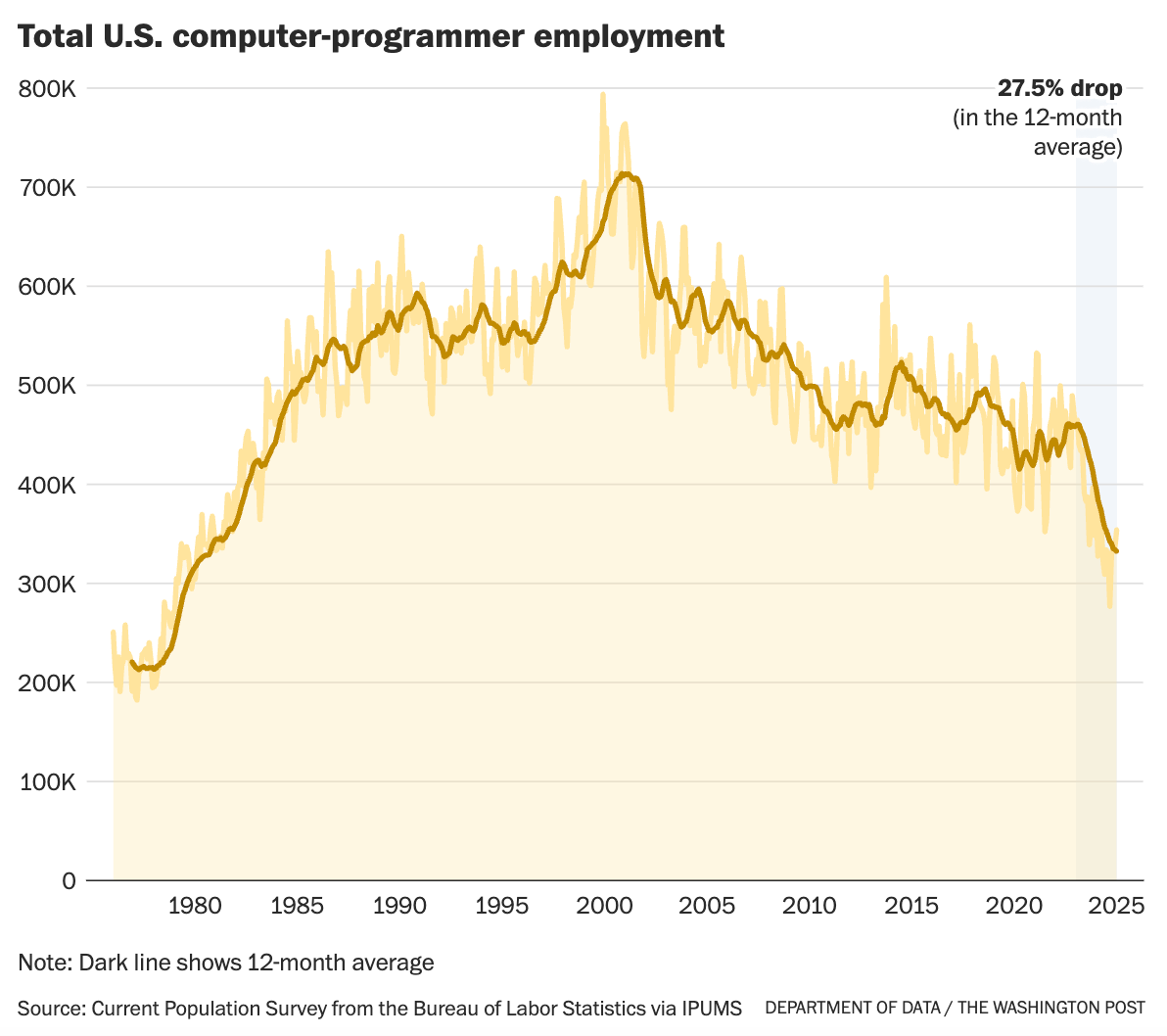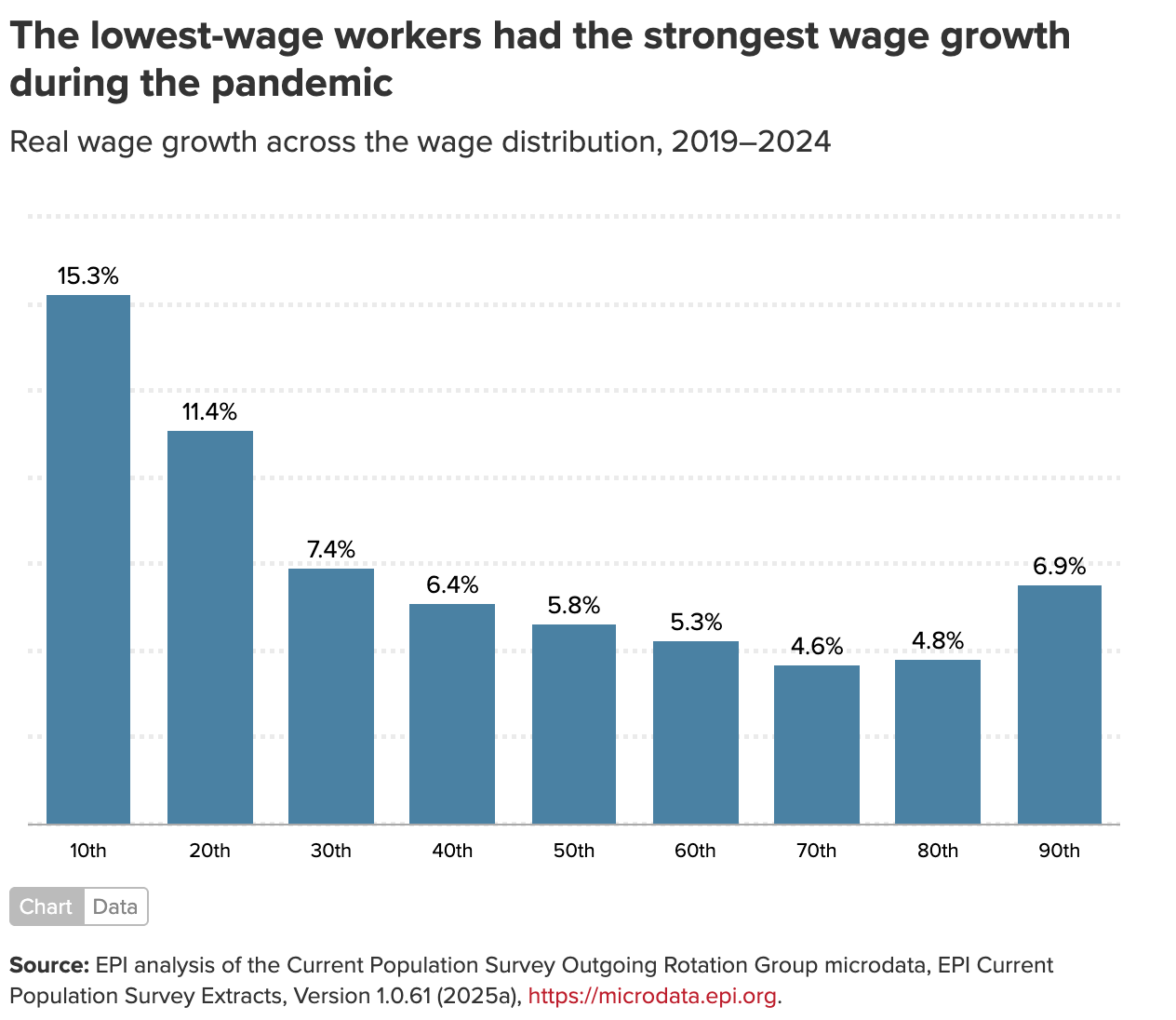Everywhere you look, you’ll hear doom and gloom about early stage careers in the US. There’s cause to be pessimistic. Between automation and offshoring, we are burning the bottom rungs of the career ladder.
Back in May, Aneesh Raman, LinkedIn’s Chief Economic Opportunity Officer, penned an Op-Ed in the NYT. There are probably few people or organizations with better insight than Mr. Raman and LinkedIn.
We saw what happened in the 1980s when our manufacturing sector steeply declined. Now it is our office workers who are staring down the same kind of technological and economic disruption.
- Aneesh Raman, New York Times Guest Essay
Dario Amodei, CEO of Anthropic, caused waves when he predicted that 50% of entry-level white collar jobs will be gone in the next five years. That might not be true universally, but it definitely seems possible in countries with high wages. Both as a result of AI and offshoring (LLMs can’t take all the credit–some of that job destruction in the US will be a result of good old fashioned arbitrage…especially when tariffs don’t apply to offshoring talent).
Fewer Job Openings, Slower Wage Growth
Fewer Job Openings
The unemployment rate for new college grades has increased 30% since 2022 (2% to 2.4%), vs. 18% for all workers. Starbucks laid off 1,000 corporate employees. Procter & Gamble is cutting 15% of their non-manufacturing workforce. Unemployment rates in finance increased 25% between 2022 and 2024. Wells Fargo has reduced their headcount for 16 straight quarters. Computer programming job openings are down 27.5% over the past 12 months.
The Knowledge Economy / white-collar jobs are vanishing. 2U shut down its coding bootcamp back in January; Momentum Learning shut their bootcamp down after a six-year run, citing employers pulling back on placements because of AI.
Meanwhile, a third of Fortune 500 companies now have corporate parks in India that employ some 2 million Indians. Cisco, Target, Bank of America, etc. And these aren’t call centers.
Now the roles are more advanced, and the people holding them often have graduate degrees. Workers are analyzing medical scans, writing marketing pitches, balancing budgets and designing state-of-the-art microchips — the kind of work that used to put Americans in the top tax brackets.
- Alex Travelli, “A Hiring Binge Abroad,” New York Times
I’m Filipino, and a stroll through Bonifacio Global City reveals row after row of multinationals with gleaming offices, like JP Morgan Chase. These businesses aren’t just call centers, but offshored HR departments, marketing, and more.

India and Filipino policy makers are currently burying their head in the sand about the impact of AI. They are pulling up giant corporate centers at a time when the World Economic Forum is forecasting the destruction of 75 million white collar jobs at the hands of AI. Will BGC sit empty in a decade?
Slower Wage Growth
Meanwhile, white collar jobs in the US aren’t paying like they used too. The competition for these coveted roles is intense, especially with AI and offshoring. Increased supply suppresses price. Talent for these roles is becoming homogenized, especially with the prospect of widespread adoption of agentic AIs.
Over the last several years, white-collar workers have actually seen slower wage growth than lower income workers (Source: Economic Policy Institute).
Delhi and Manila aren’t just burying their heads in the sands: This is a global phenomenon.
Republicans’ big beautiful bill would limit any regulation on AI for a decade. You will not hear a peep from the Trump Administration about the adverse effects of AI on the job market; only that the US will be a leader in it. Nevermind that in our competition against China, the US is facilitating this destruction, by signing deals with Gulf States and by our short-sighted policy making.
All of this will exacerbate debt, too. Fewer people working, and we can’t exactly tax AIs, just the corporations who have loopholed themselves out of the equation.
We don’t have any optimistic predictions around this labor market. Gen Z will graduate with debt and no job prospects. They will compete viciously for a dwindling pool of jobs, and the students with better connections will outperform. This will put them further and further behind.
There will be no place for people to start a career. Just a lot of people ending them.








